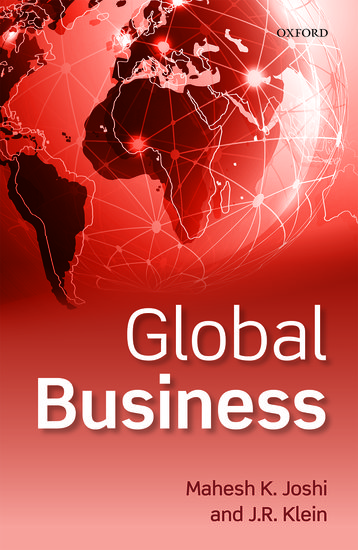Edward Carter: “Global Business” by Mahesh Joshi & J R Klein

This book is a concise attempt to grapple with the subject of the global economy, especially in the light of events such as the Brexit decision and the election of Donald Trump. Written by two business practitioners, it has a clear and slightly breathless style – one might almost say, an executive summary stretched over 150 pages.
The book is set out in four parts: (1) The World Today; (2) The Changing Worldview; (3) The Tumultuous World; (4) The World Tomorrow. While there are connections and overlaps in terms of the content throughout, there is certainly not any sense of a carefully developing argument as one moves through the different chapters. Instead, stand-alone insights are offered in a descriptive rather than an analytical manner.
In the opening chapter, I particularly noted statements along the following lines, many of which did not seem to me to be especially startling or fresh, but which none-the-less were of interest and value:
- – There has been a recent and massive growth in connectivity, population numbers, trade, GDP, and mobility of talent (page 5)
- – Disruption in global trade would have catastrophic effects (page 6)
- – Restoring trust after any major trade disruption could take decades (page 7)
- – A leading challenge to globalisation is rising inequality (page 8)
The chapter ends by including this statement: “When politics becomes the dominant feature in an economic domain the situation quickly becomes dangerous.” For me, this betrayed the methodological core of the book as understanding economics in a technical way rather than as a question for public debate and reflection.
I was therefore not surprised that chapter 2, which addresses local business, did not seem to have a deep sense of geography or engage with the political and philosophical questions surrounding the relationships between people and places. Modern economic and business theory (if not practice) famously has a weak sense of place. Chapter 3, which addresses inclusive capitalism and social purpose, also takes a rather instrumental vision of society and business, rather than feeling for an organic relationship.
Chapter 4 looks at global finance, and rightly sees this as a critical element within the globalisation of the economy. There is some interesting analysis here, but stating that “money is a commodity” (page 27) is, in my mind, to miss the unique property of the financial sector. Chapter 5 has some rich and helpful thoughts about diversity and kinship, and brings out the importance leaders have in helping others find meaning. Chapter 6, on NGOs, seemed to me to underplay the differences between these organisations and businesses, but it was helpful to see them included.
Part 2 takes the reader through the oil and gas sector, the emerging economies, China, India, Africa, and finally Australia. There are some good historical vignettes here, although I suspect the history is at times fairly superficial, and my overall impression was that these chapters are very readable, full of common sense, but somewhat lightweight on any deep or critical thinking and interpretation.
Part 3 begins with a chapter focused specifically on Brexit and Trump. There is some good descriptive work here, and the reason why these two events happened is judged to have been some kind of failure of economic theory, the need for “more active states” (page 102), and a better ‘partnership of public and private finance’ (page 103).
The rest of Part 3 covers the important subjects of new and disruptive technologies, the “internet of things”, new and much more responsive production models, lifestyle innovations, big data and analytics. I found all of this very interesting, albeit descriptive rather than attempting any thoughtful or reflective interpretation of the modern global economy.
Part 4 sets out to look ahead into the future, and considers the themes of work, human workers (over and against robots and AI), entrepreneurship, and then finally the future of globalization. Again, there is much of interest here, but mainly in terms of a description of current trends with some extrapolation rather than any far-reaching or radical “future-thinking”. Many of the developments described resonated with my own experiences, and I was especially pleased and intrigued to read the following: “The need today… is for humans to be more human-like” (page 141). This would make a great theme for a follow-up book.
Having been published in 2018 there could not, of course, have been any descriptive reference in this book to the Covid-19 virus episode, which has arguably been responsible for a bigger shock to the global economy and the assumptions underlying it than any other occurrence within the past 50 years. A bigger weakness in my mind was the strange almost complete absence of any engagement with the eco-agenda, which asks huge questions of the global economy and has rapidly become mainstream. However, notwithstanding these lacunae this book sets out a great deal of material in a concise and readable way. Alongside other more evaluative and thoughtful discussions it makes for a potentially useful resource for theorists, policy-makers and practitioners as they wrestle with the puzzles of the global economy of today.
“Global Business” by Mahesh K Joshi and J R Klein was published in 2018 by Oxford University Press (ISBN 9780198827481 ). 158pp.
 Edward Carter is Vicar of St Peter Mancroft Church in Norwich, having previously been the Canon Theologian at Chelmsford Cathedral, a parish priest in Oxfordshire, a Minor Canon at St George’s Windsor and a curate in Norwich. Prior to ordination he worked for small companies and ran his own business.
Edward Carter is Vicar of St Peter Mancroft Church in Norwich, having previously been the Canon Theologian at Chelmsford Cathedral, a parish priest in Oxfordshire, a Minor Canon at St George’s Windsor and a curate in Norwich. Prior to ordination he worked for small companies and ran his own business.
He chairs the Church Investors Group, an ecumenical body that represents over £10bn of church money, and which engages with a wide range of publicly listed companies on ethical issues. His research interests include the theology of enterprise and of competition, and his hobbies include board-games, volleyball and film-making. He is married to Sarah and they have two adult sons.
